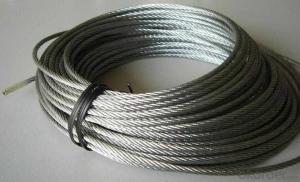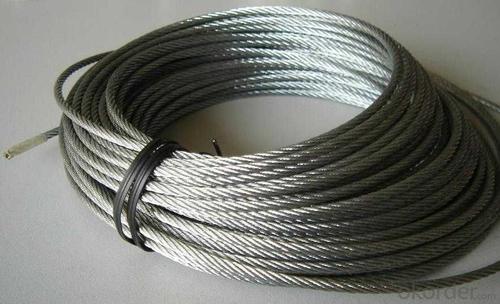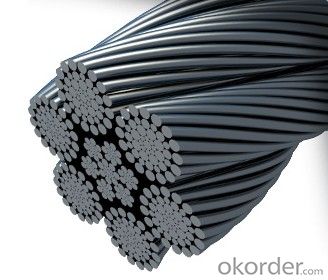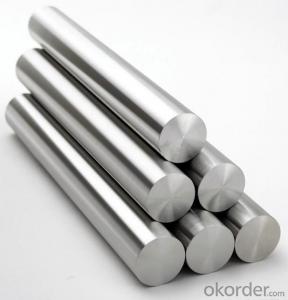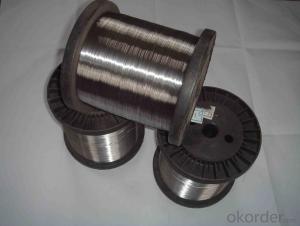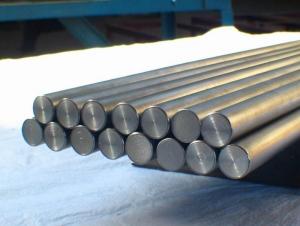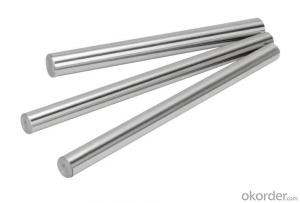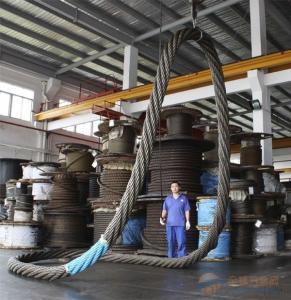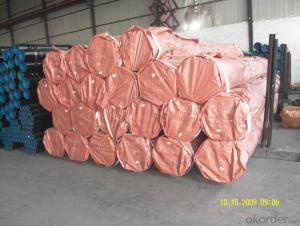302 Stainless Steel Wire Rope Hot Sale and High Quality
- Loading Port:
- Shanghai
- Payment Terms:
- TT OR LC
- Min Order Qty:
- 100 m.t.
- Supply Capability:
- 5000 m.t./month
OKorder Service Pledge
OKorder Financial Service
You Might Also Like
Specifications
304 stainless steel wire rope
- Grade: 300s,400s,200s.
- Main advantage grade: 304,304L,316,316L etc.
- Standard:AISI,ASTM,DIN,GB,JIS,CSA,AS,API,BS,IEC,CSA..
- Certification: ISO9001
- Dimeter: 0.15mm-60mm.
- Length: 200m/reel,305m/reel,500m/reel,1000m/reel,1525m/reel etc.
- Construction:1X7,1X19,6x7,7X7,6x19,7X19,6X37,7X37,8x19,19X7 etc. Many constructions to meet your requirements.
- Surface: galvanized (Electro & hot-dip)/ungalvanized , CoatedPVC/PE/NYLON steel wire rope etc.
- Technique: Hot/Cold Rolled.
- Twist Direction: RHRL,RHLL,LHRL,LHLL.
- Nominal Tensile Strength:1,570Mpa;1,670Mpa;1,770Mpa;1,870Mpa etc.
- Application:Crane cable,Trucker cable,Ship cable,Aircraft cable,Automobile clutch cable,Control cable,Telecommunication.Elevators,woven wire sieve,handcraft,Wire drawing office equipment,Electrical home appliances and raw material,Clocks and watches,Mechanical equipment,Hardware components,etc.
- Packing:Safety export wooden/plastic reel/as the requirement of customer.
- Q: What is the purpose of a steel pipe coating?
- The purpose of a steel pipe coating is to provide protection to the pipe from corrosion and other environmental factors that can lead to deterioration. Coating the pipe with a layer of material helps to create a barrier between the steel and the surrounding environment, preventing direct contact and reducing the risk of corrosion. This is especially important for pipes that are used in industries such as oil and gas, water distribution, and construction, where they are exposed to harsh conditions such as moisture, chemicals, and extreme temperatures. The coating also helps to enhance the durability and longevity of the pipe, ensuring that it can withstand the demands of its intended application. Additionally, certain types of pipe coatings can also provide insulation properties, preventing heat loss or transfer in applications where temperature control is critical. Overall, the purpose of a steel pipe coating is to protect the pipe, extend its lifespan, and ensure its optimal performance in various industries and environments.
- Q: Can steel pipes be used for conveying chemicals?
- Yes, steel pipes can be used for conveying chemicals. Steel pipes are known for their high strength and durability, making them suitable for transporting various chemicals. Additionally, they are resistant to corrosion, which is crucial when dealing with corrosive substances. However, it is important to consider the specific type of chemical being transported and ensure that the steel pipes are compatible with it to avoid any chemical reactions or damage to the pipes.
- Q: How are steel pipes used in the construction of highways?
- Steel pipes are commonly used in the construction of highways for various purposes, such as drainage systems, culverts, and sign supports. They provide a durable and efficient solution for transporting stormwater and preventing damage to the road surface. Additionally, steel pipes are utilized to support highway signs and traffic signals, ensuring their stability and longevity.
- Q: How are steel pipes used in the construction of shipbuilding?
- Steel pipes are commonly used in shipbuilding for various purposes such as transporting fluids, supporting structures, and providing stability. They are used for the construction of the ship's hull, bulkheads, and compartments, as well as for the installation of water, fuel, and ventilation systems. Steel pipes are also utilized for the construction of masts, rigging, and other ship components that require strength and durability.
- Q: Are steel pipes resistant to ultraviolet (UV) radiation?
- Ultraviolet (UV) radiation poses a threat to steel pipes as they do not possess inherent resistance. This type of radiation has the potential to induce degradation and discoloration in various materials, including steel. However, the extent of harm inflicted depends on several factors, including steel type, duration and intensity of UV exposure, and the presence of protective coatings or finishes on the pipes. Generally, uncoated steel pipes are more vulnerable to UV damage compared to those treated with protective coatings or finishes. Coatings such as epoxy or polyethylene act as a shield against UV radiation, effectively preventing steel degradation and discoloration. Hence, it becomes crucial to consider the specific application and environment when selecting steel pipes and implementing suitable protective measures to ensure their durability and performance.
- Q: What are the different types of steel pipe supports for high-temperature applications?
- There are several types of steel pipe supports designed specifically for high-temperature applications. Some common ones include rigid supports, such as rigid hangers and clamps, which provide strong support and prevent pipe movement. Expansion joints are also used to accommodate thermal expansion and contraction in the pipes. Additionally, spring supports and constant supports are employed to absorb vertical movement and maintain a consistent pipe elevation.
- Q: What is the weight of hot galvanized steel tubes? DN150 4mm wall thickness
- GB/T3091-2008: DN150 welded steel pipe, wall thickness of 6mm, the theory of the weight of welded steel pipe 24.02kg/m, galvanized steel pipe should be multiplied by the weight coefficient after galvanizing, C, DN150, wall thickness of 6mm, C=1.02, DN150, theoretical weight and wall thickness of 6mm galvanized steel 1.02*24.02= 24.5kg/m.
- Q: Are steel pipes suitable for desalination plants?
- Yes, steel pipes are suitable for desalination plants. Steel is a durable and corrosion-resistant material that can withstand the harsh conditions and high-pressure requirements of desalination processes. Additionally, steel pipes provide excellent flow characteristics and can be easily welded, making them a reliable choice for transporting and distributing saltwater in desalination plants.
- Q: How are steel pipes used in the construction of stadiums and arenas?
- Steel pipes are commonly used in the construction of stadiums and arenas for various purposes. They are primarily used for structural support, providing a sturdy framework for the buildings. Steel pipes are also used in the installation of plumbing systems, helping to transport water and other fluids throughout the facility. Additionally, steel pipes are utilized for the construction of ventilation and HVAC systems, ensuring proper air circulation and temperature control within the stadiums and arenas.
- Q: How are steel pipes connected in pipeline construction?
- Steel pipes are connected in pipeline construction through various methods, such as welding, threading, and flanges. Welding involves melting the ends of two pipes together to form a strong and permanent bond. Threading involves cutting grooves into the ends of pipes, which are then screwed together using threaded fittings. Flanges are used to connect pipes by bolting them together, creating a secure and leak-proof connection. These connection methods ensure the integrity and durability of the pipeline system.
Send your message to us
302 Stainless Steel Wire Rope Hot Sale and High Quality
- Loading Port:
- Shanghai
- Payment Terms:
- TT OR LC
- Min Order Qty:
- 100 m.t.
- Supply Capability:
- 5000 m.t./month
OKorder Service Pledge
OKorder Financial Service
Similar products
Hot products
Hot Searches
Related keywords
